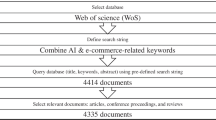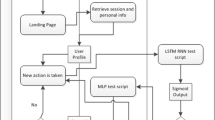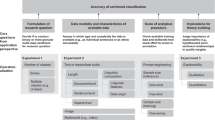Abstract
In the age of Web 2.0, the rapid growth of user-generated content (e.g., consumer reviews) on the Internet offers ample avenues to search for information useful to both people and companies. Prior works in this field relating to movies have focused on the average rating and the number of comments. In this study, we used the content of consumer reviews and propose a novel framework integrating opinion mining and machine learning techniques to explore contextual factors influencing box-office revenue. Moreover, we analyzed movie review data from the website Internet Movie Database to examine the relationship among time periods, users’ opinion, and changes in box-office patterns. Experimental evaluations demonstrated that changes in different aspects of opinions effected a change in box-office revenue. Thus, movie marketers should monitor changes in the various aspects of online reviews and accordingly devise e-marketing strategies.









Similar content being viewed by others
References
Agrawal, R., Imieliński, T., & Swami, A. (1993). Mining association rules between sets of items in large databases. Paper presented at the Acm sigmod record.
Bellazzi, R., Larizza, C., Magni, P., & Bellazzi, R. (2005). Temporal data mining for the quality assessment of hemodialysis services. Artificial Intelligence in Medicine, 34(1), 25–39.
Bhattacharjee, B., Sridhar, A., & Dutta, A. (2017). Identifying the causal relationship between social media content of a Bollywood movie and its box-office success-a text mining approach. International Journal of Business Information Systems, 24(3), 344–368.
Chen, Y., & Xie, J. (2008). Online consumer review: Word-of-mouth as a new element of marketing communication mix. Management Science, 54(3), 477–491.
Cheng, L.-C., Hu, Y.-H., & Chiou, S.-H. (2017). Applying the temporal abstraction technique to the prediction of chronic kidney disease progression. Journal of Medical Systems, 41(5), 85.
Cheng, L.-C., & Huang, C.-L. (2015). Mining some important features from IMDb reviews. In Paper presented at the international conference on innovation and management.
Chevalier, J. A., & Mayzlin, D. (2006). The effect of word of mouth on sales: Online book reviews. Journal of Marketing Research, 43(3), 345–354.
Cui, G., Lui, H.-K., & Guo, X. (2012). The effect of online consumer reviews on new product sales. International Journal of Electronic Commerce, 17(1), 39–58.
Dellarocas, C., Zhang, X. M., & Awad, N. F. (2007). Exploring the value of online product reviews in forecasting sales: The case of motion pictures. Journal of Interactive marketing, 21(4), 23–45.
Ghose, A., & Ipeirotis, P. G. (2011). Estimating the helpfulness and economic impact of product reviews: Mining text and reviewer characteristics. IEEE Transactions on Knowledge and Data Engineering, 23(10), 1498–1512.
Hai, Z., Chang, K., & Kim, J. (2011). Implicit feature identification via co-occurrence association rule mining. In A. F. Gelbukh (Ed.), Computational linguistics and intelligent text processing. CICLing 2011. Lecture notes in computer science (Vol. 6608, pp. 393–404). Berlin: Springer.
Hu, H. W., Chen, Y. L., & Hsu, P. T. (2016). A novel approach to rate and summarize online reviews according to user-specified aspects. Journal of Electronic Commerce Research, 17(2), 132.
Hu, N., Koh, N. S., & Reddy, S. K. (2014). Ratings lead you to the product, reviews help you clinch it? The mediating role of online review sentiments on product sales. Decision Support Systems, 57, 42–53.
Iqbal, R., Doctor, F., More, B., Mahmud, S., & Yousuf, U. (2018). Big Data analytics: Computational intelligence techniques and application areas. International Journal of Information Management. https://doi.org/10.1016/j.techfore.2018.03.024.
Kim, S. H., Park, N., & Park, S. H. (2013). Exploring the effects of online word of mouth and expert reviews on theatrical movies’ box office success. Journal of Media Economics, 26(2), 98–114.
Lash, M. T., & Zhao, K. (2016). Early predictions of movie success: The who, what, and when of profitability. Journal of Management Information Systems, 33(3), 874–903.
Lee, J. H., Jung, S. H., & Park, J. (2017). The role of entropy of review text sentiments on online WOM and movie box office sales. Electronic Commerce Research and Applications, 22, 42–52.
Liu, B. (2012). Sentiment analysis and opinion mining. Synthesis Lectures on Human Language Technologies, 5(1), 1–167.
Liu, B., Hsu, W., & Ma, Y. (1998). Integrating classification and association rule mining. In Paper presented at the proceedings of the 4th international conference on knowledge discovery and data mining.
Liu, Y. (2006). Word of mouth for movies: Its dynamics and impact on box office revenue. Journal of Marketing, 70(3), 74–89.
Liu, Y., Huang, X., An, A., & Yu, X. (2007). ARSA: A sentiment-aware model for predicting sales performance using blogs. In Paper presented at the proceedings of the 30th annual international ACM SIGIR conference on research and development in information retrieval.
Lu, Q., Ye, Q., & Law, R. (2014). Moderating effects of product heterogeneity between online word-of-mouth and hotel sales. Journal of Electronic Commerce Research, 15(1), 1–12.
Mishne, G., & Glance, N. S. (2006). Predicting movie sales from blogger sentiment. In Paper presented at the AAAI spring symposium: Computational approaches to analyzing weblogs.
Moghaddam, S., & Ester, M. (2010). Opinion digger: An unsupervised opinion miner from unstructured product reviews. In Paper presented at the proceedings of the 19th ACM international conference on information and knowledge management.
Mooney, R. J., & Bunescu, R. (2005). Mining knowledge from text using information extraction. ACM SIGKDD Explorations Newsletter, 7(1), 3–10.
Orhun, A. Y., Venkataraman, S., & Chintagunta, P. K. (2015). Impact of competition on product decisions: Movie choices of exhibitors. Marketing Science, 35(1), 73–92.
Orphanou, K., Stassopoulou, A., & Keravnou, E. (2014). Temporal abstraction and temporal Bayesian networks in clinical domains: A survey. Artificial Intelligence in Medicine, 60(3), 133–149.
Pang, B., & Lee, L. (2008). Opinion mining and sentiment analysis. Foundations and Trends® in Information Retrieval, 2(1–2), 1–135.
Popescu, A. M., & Etzioni, O. (2007). Extracting product features and opinions from reviews. In A. Kao & S. R. Poteet (Eds.), Natural language processing and text mining (pp. 9–28). London: Springer.
Purnawirawan, N., Dens, N., & De Pelsmacker, P. (2014). Expert reviewers beware! The effects of review set balance, review source and review content on consumer responses to online reviews. Journal of Electronic Commerce Research, 15(3), 162.
Shahar, Y. (1997). A framework for knowledge-based temporal abstraction. Artificial Intelligence, 90(1), 79–133.
Su, Q., Xu, X., Guo, H., Guo, Z., Wu, X., Zhang, X., et al. (2008). Hidden sentiment association in chinese web opinion mining. In Proceedings of the 17th international conference on World Wide Web (pp. 959–968).
Ye, Q., Law, R., & Gu, B. (2009). The impact of online user reviews on hotel room sales. International Journal of Hospitality Management, 28(1), 180–182.
Yu, X., Liu, Y., Huang, X., & An, A. (2012). Mining online reviews for predicting sales performance: A case study in the movie domain. IEEE Transactions on Knowledge and Data Engineering, 24(4), 720–734.
Zhu, F., & Zhang, X. (2010). Impact of online consumer reviews on sales: The moderating role of product and consumer characteristics. Journal of marketing, 74(2), 133–148.
Zhuang, L., Jing, F., & Zhu, X. Y. (2006). Movie review mining and summarization. In Paper presented at the proceedings of the 15th ACM international conference on information and knowledge management.
Acknowledgements
This study was supported in part by the Ministry of Science and Technology of Taiwan under the Grants NSC 102-2410-H-031-058-MY3 and MOST 105-2410-H-031-035-MY3.
Author information
Authors and Affiliations
Corresponding author
Additional information
Publisher's Note
Springer Nature remains neutral with regard to jurisdictional claims in published maps and institutional affiliations.
Rights and permissions
About this article
Cite this article
Cheng, LC., Huang, CL. Exploring contextual factors from consumer reviews affecting movie sales: an opinion mining approach. Electron Commer Res 20, 807–832 (2020). https://doi.org/10.1007/s10660-019-09332-z
Published:
Issue Date:
DOI: https://doi.org/10.1007/s10660-019-09332-z




